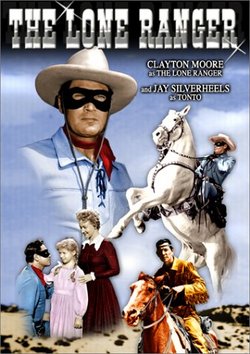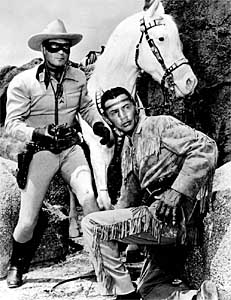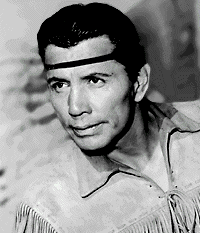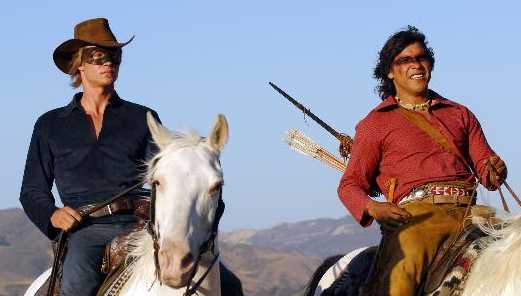 Another Stereotype of the Month entry:
Another Stereotype of the Month entry:
 Another Stereotype of the Month entry:
Another Stereotype of the Month entry:
Canada says "kemosabe" not racist
Wed Nov 3, 4:34 AM ET
OTTAWA (Reuters) -- "Kemosabe", the name given to the Lone Ranger by his friend Tonto in the 1950s TV western "The Lone Ranger", is not a racist term, a Canadian court has found.
The ruling was delivered by the Nova Scotia Court of Appeal last week in a case involving a native Canadian woman who complained that the manager of the store where she worked had created a poisoned environment by calling her kemosabe.
The manager of the second-hand sports store, in Sydney, Nova Scotia, argued kemosabe was a term he used to address customers as well as employees.
The court ruling confirmed a earlier decision by a Nova Scotia Human Rights Commission board of inquiry. That decision was made after the board spent a full shift watching "Lone Ranger" reruns.
The board found that at the start of their relationship, Tonto, a native American, had recognised the injured Lone Ranger as the man who had saved his life years before, and started calling him kemosabe.
"When asked what it meant, Tonto responded 'trusty friend,'" the board found. "Both the Lone Ranger and Tonto treat one another with respect...At no time during the episodes is the term kemosabe ever used in a demeaning or derogatory manner."
The board found, however, that while Tonto was always treated with respect, the long-running U.S. TV series treated other native American characters in a demeaning manner.
The case continues
From the Toronto Star:
Dec. 22, 2004. 06:52 PM
Ruling that 'Kemosabe' not racist is appealed
CANADIAN PRESS
HALIFAX -- Canada's highest court has been asked to overturn a ruling that the term "Kemosabe" wasn't overtly racist when used to address an aboriginal woman in Cape Breton.
The Nova Scotia Human Rights Commission announced today that it would take the unusual step of asking the Supreme Court of Canada to hear its appeal over a word used by the character Tonto in the old TV series The Lone Ranger.
The commission argues that an independent human rights board of inquiry, and the Nova Scotia Court of Appeal, erred by saying the word wasn't "notoriously offensive" and that the woman should have "clearly" objected when her boss referred to her in that way.
The original complaint came in 1999 when Trevor Muller, the owner of Play it Again Sports in Sydney, N.S., and his father Ronald Muller, referred to a Mik'maq employee, Dorothy Kateri Moore, as Kemosabe as she went about her work.
Moore, 38, went to the province's human rights commission after quitting the sales job, arguing the term -- dreamed up by script writers of The Lone Ranger -- was used in a demeaning way.
The board rejected her complaint in February, and its decision was upheld by the Appeal Court on Oct. 29.

Mayann Francis, the human rights commission's chief executive, said the commissioners decided to appeal within days of reading the Appeal Court's decision.
"Words can be very painful, they can be very hurtful," she said in an interview.
"If we're going to accept that slurs that are either sexual or racial are acceptable, then what kind of workplace do we have?"
The term became popular after it was used by the Lone Ranger's sidekick, Tonto, in television, radio and film series that aired in the 1940s and '50s. Tonto, a native American in the series, referred to the Lone Ranger as Kemosabe as they charged about on various adventures.
Tonto was played in the TV series by Jay Silverheels, a Mohawk from the Six Nations reserve near Brantford.
Though the board of inquiry found the series was derogatory towards natives, it concluded that Tonto used the word in a positive way toward his non-native companion.
Trevor Muller said he believed the term meant "faithful friend" and used it frequently in his shop with various employees.
There was mixed testimony from Mi'kmaq witnesses on the word's meaning during the board of inquiry.
Daniel Paul, an aboriginal customer of the store, testified he wasn't offended when called Kemosabe by Trevor Muller because he didn't believe the word was being used in a derogatory way.
However, Bernie Francis, a native linguist, testified it has become a racial slur in the decades since the program.
The Appeal Court accepted the inquiry's conclusions that it wasn't dealing with a word "which was clearly on its face notoriously offensive."
It also said that because the word wasn't overtly racist, there was an onus on Moore to "clearly and unequivocally" show her disapproval.
In testimony, Moore said she'd told Muller she preferred the Mi'kmaq word for friend, nitap, but she hadn't vociferously objected to Kemosabe.
Commission lawyer Michael Wood said the court is setting too high a standard for employees who may feel racially harassed.
"In this case the court said if the word isn't notoriously offensive, then there's a greater burden on the complainant to voice their objection. But our question is: how does an individual know if a word is notoriously offensive? If they find it offensive, how do they know if everybody else does?"
Wood said it's a difficult standard to meet as employees aren't generally in a position to voice strong objections to employers.
Reached at her home in Membertou, Moore said she was surprised and pleased the commission decided to pursue the case.
"It's been going on so long," she said.
"I couldn't believe we lost the initial case. I was shocked. . . . You can't go around calling people Kemosabe these days and think you're going to get away with it."

Tonto the fool?
Activist Terri Jean explained why "kemosabe" might be offensive in "I Ain't Your Kemosabe!" (11/30/04):
There are several theories as to the true meaning of "kemosabe." Some say it's from an Ojibwa or Potowatmi word meaning "sneaky" or "sly-looking," others say it's the Navajo word -- kemo sabe -- which means "soggy Shrub," while Jim Jewell, who directed the series until 1938, said he took the name from a Michigan boys' camp at Mullet Lake called Kamp Kee-Mo-Sah-Bee, which was supposed to mean "trusty scout."
Regardless of what it meant back then, it carries a different meaning today. Most people I know use the term as a jocular form of address. It's something you may say to your friend when they do or say something stupid or foolish, such as "Nice job, kemosabe."
So how did it go from "trusty friend" to "fool"? Perhaps it's because today we perceive Tonto as a walking stereotype. Yes, he was one of the first "civilized" Indians portrayed on television, but Tonto lacked a culture, substance, and a life of his own. He was nothing more than a quiet, subservient Lone Ranger side kick who spoke broken English while fighting side-by-side against his own people -- i.e. the "bad Indians." He epitomized what every white person wanted the Native people to be. He was the "good Indian."
Rob's comment
Some theories on the origin of "kemosabe":
The Straight Dope: In the old Lone Ranger series, what did "kemosabe" mean?
I agree with Terri Jean about Tonto, but I don't agree with her position on "kemosabe." I don't see any evidence that the meaning of the word is inherently racist. "Kemosabe" rarely comes up in casual conversation, and I've never heard it used when somebody did something stupid or foolish. Without supporting evidence, this anecdotal claim is weak.
Nevertheless, if the meaning of "kemosabe" isn't racist, its use may be. However "friendly" his intent, Muller seems to have applied the word only to aboriginals. In other words, he distinguished them by race in word and deed.
This may be only a minor and benign form of racism, but it's worth noting. I usually don't include the actions of individuals, but a court upheld Muller action. That makes the problem institutional in nature, not personal.
The word "kemosabe" is a made-up honorific, not a real one. Tonto used it to formally acknowledge the Lone Ranger, who was arguably his superior. Rather than uniting the pair, it served to subtly keep them apart. Tonto couldn't treat the Ranger like a true equal—e.g., couldn't slap him on the back and say, "Hey, Johnny, how's it going?" He felt obligated to use the (made-up) honorific because (in the show's worldview) Indians must remain separate but equal. They must know their place.
Did Tonto ever challenge the Ranger...disagree with him...go act against his wishes? Not that I recall. True friends occasionally quarrel or fight, but a deferential "friend" doesn't argue with his kemosabe.
If Muller applied "kemosabe" to people of every race, not just aboriginals, I don't think Moore would have cause to protest. If aboriginals used the word freely, I don't think Muller would be wrong to use it also. But nothing in the articles indicates that these conditions applied.
It seems Muller used the word to single out aboriginals. It made one of them feel like Tonto (even though it was normally Tonto's word). In today's multicultural world, where everyone is equal, there's no good reason to single out members of one race with a special word.

Rob misunderstood?
After reading the above analysis, correspondent Bonnie wrote to question it. Her comments and my replies:
Hey Rob -- I was reading your Stereotypes of the Month and I think you misunderstood something in your "Kemosabe" entry. You say:
Regardless of what it meant back then, it carries a different meaning today.
I agree that "kemosabe" means "fool". However, it's not Tonto who's the fool. "Kemosabe" is the Lone Ranger. The running joke is that Tonto told the Lone Ranger that "kemosabe" means trusty friend but it really means horse's ass or whatever. Everyone knows this joke from third grade:
The Lone Ranger and Tonto were visiting Tonto's tribe. The Lone Ranger had looked forward to this as he had never met any of his companion's people.
They had a wonderful visit. The Indians were warm and charming hosts. The Lone Ranger was treated like a king. About the third day he was walking with the chief when they passed behind some grazing horses.
"Careful," the chief grunted pointing towards the ground. "Don't step in the kemosabe."
People have long recognized that the Lone Ranger treated Tonto like a retard, and that Tonto deserved better. That's why "kemosabe" is an insult -- I'm comparing you to the Lone Ranger, that dork! I do agree that calling an Indian "kemosabe" is in poor taste but I see it the same as if a Mexican guy came into the store and the white owner called him "Senor". The white dude is trying to appropriate his culture and that's not cool.
Bonnie
>> I was reading your Stereotypes of the Month and I think you misunderstood something in your "Kemosabe" entry. You say:
"Regardless of what it meant back then, it carries a different meaning today." <<
Check the page again. I quoted someone else—activist Terri Jean—who said that. I didn't say it myself.
In fact, I said I didn't agree with her theory. As far as I could tell, it was nothing more than her opinion that "kemosabe" had changed meanings from "trusty friend" to "fool."
>> I agree that "kemosabe" means "fool". However, it's not Tonto who's the fool. "Kemosabe" is the Lone Ranger. <<
This interpretation or "joke" is a completely modern (or post-modern) interpretation of the old show. There's nothing in the show itself to justify it.
>> People have long recognized that the Lone Ranger treated Tonto like a retard, and that Tonto deserved better. That's why "kemosabe" is an insult -- I'm comparing you to the Lone Ranger, that dork! <<
I'd say the standard interpretation is the more obvious and likely one. Tonto uses "kemosabe" as a genuine honorific, not a sarcastic one. That's why I said its meaning isn't racist, especially if someone applies it to Natives and non-Natives alike.
In my mind, the only problem is if someone applies it only to Natives—even if he intends it to mean "trusty friend." Why? Because even if Tonto considered the Lone Ranger his trusty friend, the Ranger didn't treat him as a true equal. Tonto may have been a casual friend to him, like a work colleague at work, but not someone he'd share intimate secrets with.
So applying "kemosabe" to Natives is mocking this halfhearted friendship. "You're a trusty friend the same way Tonto was the Ranger's trusty friend," it seems to be saying. In other words, you're less of a trusty friend than you think you are—just as Tonto was to the Ranger. You're a colleague, associate, or sidekick, not someone equal to me.
>> I do agree that calling an Indian "kemosabe" is in poor taste but I see it the same as if a Mexican guy came into the store and the white owner called him "Senor". The white dude is trying to appropriate his culture and that's not cool. <<
This may be valid, but it's a different criticism from what you said above. In fact, it's a good analogy for my point, not yours. No one could complain that the title "Senor" secretly means "fool." But you still could complain if a white store owner used it only for Hispanics. You could argue that he was only honoring Hispanics with their own form of speech. Or you could argue that he was distinguishing Hispanics as a separate class of people from his own. He was discriminating, in other words.
Rob
More on the story
Supreme Court rejects hearing 'Kemosabe' appeal
Related links
Tonto and the "good Indian"
|
. . . |

|
All material © copyright its original owners, except where noted.
Original text and pictures © copyright 2007 by Robert Schmidt.
Copyrighted material is posted under the Fair Use provision of the Copyright Act,
which allows copying for nonprofit educational uses including criticism and commentary.
Comments sent to the publisher become the property of Blue Corn Comics
and may be used in other postings without permission.